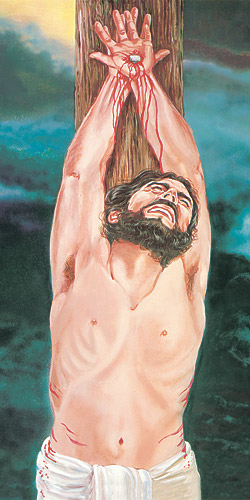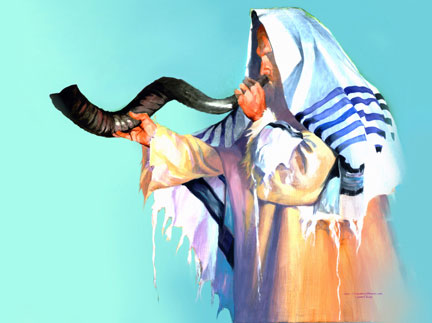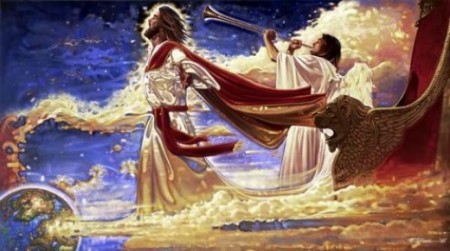Each year on the 10th of Tishri (7th Jewish month), the atmosphere in Yisra'El would be one of great fasting, prayer, repentance and anticipation.This is because this day has been singled out and is observed as the holiest day of the year. It is the day in which the Kohen Gadol (High Priest) enters the Kodesh Kodashim (Holy of Holies), to make atonement for the sins of Yisra'El. This day is known as Yom Kippur, or the Day of Atonement. Like unto the other festivals of Yahweh, Yom Kippur has been sadly disregarded by many Christians today. The embodiment of this festival however, is so rich that no person who believes in the Messiah and truly wishes to serve the Creator of heaven and earth, can ignore.
On Yom Kippur the Kohen Gadol would take a bull and two rams from the children of Yisra'El as special offerings (Lev.16:5). The bull would be slaughtered for the sins of the Kohen Gadol and his household (Lev.16:6), as well as any defilement he or his household may have caused on the mishkan (temple) by their [possible] misdeeds. Having been cleansed by the blood of the bull, the Kohen Gadol is now fit to make atonement for the sins of Yisra'El. He begins by placing both goats before Yahweh through the casting of lots (Lev.16:8). One goat would then be selected to pay the penalty for sin by dying, whilst the other will take the sins from Yisra'El out into the wilderness. During this time the children of Yisra'El would afflict their souls (a complete dedication to fasting and prayer) (Lev.16:29). When the first goat is slaughtered, the blood is taken into the Kodesh Kodashim and sprinkled on the mercy seat and on the veil. The same blood is later taken outside and sprinkled on the alter. All this sprinkling of blood is done to symbolically purify the mishkan, Yisra'El and the alter on which the sacrifices are made. Symbolically, this portrays a renewed Yisra'El - one without sin. After the Kohen Gadol has completed sprinkling the blood seven times as he was commanded, he is to take the live goat, lay both his hands on the head of the goat and confess all the sins of Yisra'El upon it, then send it off to wander in the wilderness (Lev.16:20-21). The Kohen Gadol will again return to the mishkan, take off his bloody clothes, bathe himself, change into new garments, and then offer burnt sacrifice unto Yahweh (Lev.16:23-24). It is believed that a miracle would occur at the end of Yom Kippur, where the bloody garments of the Kohen Gadol will turn to white, signifying that Yahweh has accepted their sacrifice and the sins have truly be taken away from Yisra'El. This belief is founded upon the words of Yahweh in Isaiah 1:18.
Admittedly the procedure documented in Leviticus 16 does seem a bit complicated. In fact, it could possibly be a 'turn off' for most people. Many will sigh a breath of relief, as they believe those days are now 'done away with', hence the observance of this festival is no longer necessary; but is this a reality? In Leviticus 16:29 Yahweh stated that this law would be with us forever. Was this "forever" conditional? Yahshua alluded to the continuation of the law in Matthew 5:18. Evidently therefore, this festival serves a purpose, and was intended to be observed even now.
 Yom Kippur is a practical example of what it requires to remove sin from humanity and reconcile man to Yahweh. It was a "hands-on" experience for Yisra'El, and a glimpse of what the Messiah would later do for them, and the rest of the world. It was an introduction to the "Life for a Life" principle found in Leviticus 17:11, which paved the way for an understanding that an innocent blood would later be shed for the remission of our sins. This blood is the blood of Yahshua the Messiah! Yom Kippur therefore is the embodiment of the result of Yahshua's death on the stake. Everything that the Kohen Gadol did on Yom Kippur was an indication of what the Messiah would have done at Calvary. As the goat was innocently slaughtered for Yisra'El, so was Yahshua innocently slaughtered for us (Isa.53:6,7). The sprinkling of the goat's blood seven times was symbolic of Yahshua's blood completely atoning for our sins once and for all. This is why He cried out in John 19:30 "It is finished!". Sha'ul alluded to the finality of Yahshua's atoning work in Hebrews 9:28. The transferring of sin from Yisra'El to the live goat was also a representation of what Yahshua did. The sins of the world were laid upon Yahshua, who in turn bore them to His grave (Isa.53:6, 2Cor.5:21, Jn.1:29). The Messiah not only paid the penalty for our sins, He also bore them Himself -in so much that for the first time in His life He felt separated from His Father (Matt.27:46). This is what Yom Kippur is about - the atoning work of the Messiah.
Yom Kippur is a practical example of what it requires to remove sin from humanity and reconcile man to Yahweh. It was a "hands-on" experience for Yisra'El, and a glimpse of what the Messiah would later do for them, and the rest of the world. It was an introduction to the "Life for a Life" principle found in Leviticus 17:11, which paved the way for an understanding that an innocent blood would later be shed for the remission of our sins. This blood is the blood of Yahshua the Messiah! Yom Kippur therefore is the embodiment of the result of Yahshua's death on the stake. Everything that the Kohen Gadol did on Yom Kippur was an indication of what the Messiah would have done at Calvary. As the goat was innocently slaughtered for Yisra'El, so was Yahshua innocently slaughtered for us (Isa.53:6,7). The sprinkling of the goat's blood seven times was symbolic of Yahshua's blood completely atoning for our sins once and for all. This is why He cried out in John 19:30 "It is finished!". Sha'ul alluded to the finality of Yahshua's atoning work in Hebrews 9:28. The transferring of sin from Yisra'El to the live goat was also a representation of what Yahshua did. The sins of the world were laid upon Yahshua, who in turn bore them to His grave (Isa.53:6, 2Cor.5:21, Jn.1:29). The Messiah not only paid the penalty for our sins, He also bore them Himself -in so much that for the first time in His life He felt separated from His Father (Matt.27:46). This is what Yom Kippur is about - the atoning work of the Messiah.
Contrary to popular beliefs, Yom Kippur is NOT a day of pain and sorrow. It is a day of reverence and humility. Often times the 24 hour fast and the phrase "afflict your soul", is interpreted as a negative concept, thus portraying Yom Kippur to be something that it is not. The Hebrew word for "afflict" as seen throughout Leviticus 16 is "anah", and it speaks to humbling oneself or being occupied. The affliction of the soul that Yahweh commanded therefore is not a chastisement of the body or a self-inflicted punishment for sin, but rather, it is period of selfless humility and having the mind being focused on the spiritual man. Yahweh has never been in the business of causing harm to human or commanding self-inflicted punishment. In fact, these are things that Yahweh detests!
In light of the fact that Yahshua has completed or fulfilled the atonement, do we still need to observe the festival? ... YES WE DO! Many people tend to [conveniently] confuse "fulfillment" with "abolition". There is a distinct difference between the two. Yahshua in Matthew 5:17 stated He did not come to abolish the law but to fulfill them. If abolition and fulfillment were one and the same, then Yahshua would have been saying "I did not come to abolish the law but to abolish them", which would have made no sense at all. Evidently therefore there is a distinction between the two. The Greek word for "fulfill" as seen in Matthew 5:17 is "pleroo", and it means to make full, to fill up, to full so that nothing is left wanting, to execute or carry out. It is the same word used in Matthew 3:15 when Yahshua said "to fulfill all righteousness" ... does this mean righteousness is abolished? I think not! Yahshua's fulfillment of the law therefore was His obedience to the law as He carried out what was commanded of Him. In the same light we are expected to obey all the commandments of Yahweh. Although Yahshua's work was finished at Calvary, "atonement" is still not finished. We continue to sin, so we are continuously in need of atonement. Since we are still in need of atonement, Yom Kippur still serves its purpose; hence it ought to be observed. The instructions for the observance of Feast of Atonement (Yom Kippur) are seen in Leviticus 16:29-31. Observe the festival unto Yahweh!
Yom Kippur in Yisra'El
On Yom Kippur the Kohen Gadol would take a bull and two rams from the children of Yisra'El as special offerings (Lev.16:5). The bull would be slaughtered for the sins of the Kohen Gadol and his household (Lev.16:6), as well as any defilement he or his household may have caused on the mishkan (temple) by their [possible] misdeeds. Having been cleansed by the blood of the bull, the Kohen Gadol is now fit to make atonement for the sins of Yisra'El. He begins by placing both goats before Yahweh through the casting of lots (Lev.16:8). One goat would then be selected to pay the penalty for sin by dying, whilst the other will take the sins from Yisra'El out into the wilderness. During this time the children of Yisra'El would afflict their souls (a complete dedication to fasting and prayer) (Lev.16:29). When the first goat is slaughtered, the blood is taken into the Kodesh Kodashim and sprinkled on the mercy seat and on the veil. The same blood is later taken outside and sprinkled on the alter. All this sprinkling of blood is done to symbolically purify the mishkan, Yisra'El and the alter on which the sacrifices are made. Symbolically, this portrays a renewed Yisra'El - one without sin. After the Kohen Gadol has completed sprinkling the blood seven times as he was commanded, he is to take the live goat, lay both his hands on the head of the goat and confess all the sins of Yisra'El upon it, then send it off to wander in the wilderness (Lev.16:20-21). The Kohen Gadol will again return to the mishkan, take off his bloody clothes, bathe himself, change into new garments, and then offer burnt sacrifice unto Yahweh (Lev.16:23-24). It is believed that a miracle would occur at the end of Yom Kippur, where the bloody garments of the Kohen Gadol will turn to white, signifying that Yahweh has accepted their sacrifice and the sins have truly be taken away from Yisra'El. This belief is founded upon the words of Yahweh in Isaiah 1:18.
Understanding Yom Kippur
Admittedly the procedure documented in Leviticus 16 does seem a bit complicated. In fact, it could possibly be a 'turn off' for most people. Many will sigh a breath of relief, as they believe those days are now 'done away with', hence the observance of this festival is no longer necessary; but is this a reality? In Leviticus 16:29 Yahweh stated that this law would be with us forever. Was this "forever" conditional? Yahshua alluded to the continuation of the law in Matthew 5:18. Evidently therefore, this festival serves a purpose, and was intended to be observed even now.
 Yom Kippur is a practical example of what it requires to remove sin from humanity and reconcile man to Yahweh. It was a "hands-on" experience for Yisra'El, and a glimpse of what the Messiah would later do for them, and the rest of the world. It was an introduction to the "Life for a Life" principle found in Leviticus 17:11, which paved the way for an understanding that an innocent blood would later be shed for the remission of our sins. This blood is the blood of Yahshua the Messiah! Yom Kippur therefore is the embodiment of the result of Yahshua's death on the stake. Everything that the Kohen Gadol did on Yom Kippur was an indication of what the Messiah would have done at Calvary. As the goat was innocently slaughtered for Yisra'El, so was Yahshua innocently slaughtered for us (Isa.53:6,7). The sprinkling of the goat's blood seven times was symbolic of Yahshua's blood completely atoning for our sins once and for all. This is why He cried out in John 19:30 "It is finished!". Sha'ul alluded to the finality of Yahshua's atoning work in Hebrews 9:28. The transferring of sin from Yisra'El to the live goat was also a representation of what Yahshua did. The sins of the world were laid upon Yahshua, who in turn bore them to His grave (Isa.53:6, 2Cor.5:21, Jn.1:29). The Messiah not only paid the penalty for our sins, He also bore them Himself -in so much that for the first time in His life He felt separated from His Father (Matt.27:46). This is what Yom Kippur is about - the atoning work of the Messiah.
Yom Kippur is a practical example of what it requires to remove sin from humanity and reconcile man to Yahweh. It was a "hands-on" experience for Yisra'El, and a glimpse of what the Messiah would later do for them, and the rest of the world. It was an introduction to the "Life for a Life" principle found in Leviticus 17:11, which paved the way for an understanding that an innocent blood would later be shed for the remission of our sins. This blood is the blood of Yahshua the Messiah! Yom Kippur therefore is the embodiment of the result of Yahshua's death on the stake. Everything that the Kohen Gadol did on Yom Kippur was an indication of what the Messiah would have done at Calvary. As the goat was innocently slaughtered for Yisra'El, so was Yahshua innocently slaughtered for us (Isa.53:6,7). The sprinkling of the goat's blood seven times was symbolic of Yahshua's blood completely atoning for our sins once and for all. This is why He cried out in John 19:30 "It is finished!". Sha'ul alluded to the finality of Yahshua's atoning work in Hebrews 9:28. The transferring of sin from Yisra'El to the live goat was also a representation of what Yahshua did. The sins of the world were laid upon Yahshua, who in turn bore them to His grave (Isa.53:6, 2Cor.5:21, Jn.1:29). The Messiah not only paid the penalty for our sins, He also bore them Himself -in so much that for the first time in His life He felt separated from His Father (Matt.27:46). This is what Yom Kippur is about - the atoning work of the Messiah.Contrary to popular beliefs, Yom Kippur is NOT a day of pain and sorrow. It is a day of reverence and humility. Often times the 24 hour fast and the phrase "afflict your soul", is interpreted as a negative concept, thus portraying Yom Kippur to be something that it is not. The Hebrew word for "afflict" as seen throughout Leviticus 16 is "anah", and it speaks to humbling oneself or being occupied. The affliction of the soul that Yahweh commanded therefore is not a chastisement of the body or a self-inflicted punishment for sin, but rather, it is period of selfless humility and having the mind being focused on the spiritual man. Yahweh has never been in the business of causing harm to human or commanding self-inflicted punishment. In fact, these are things that Yahweh detests!
Fulfilled, NOT Abolished
In light of the fact that Yahshua has completed or fulfilled the atonement, do we still need to observe the festival? ... YES WE DO! Many people tend to [conveniently] confuse "fulfillment" with "abolition". There is a distinct difference between the two. Yahshua in Matthew 5:17 stated He did not come to abolish the law but to fulfill them. If abolition and fulfillment were one and the same, then Yahshua would have been saying "I did not come to abolish the law but to abolish them", which would have made no sense at all. Evidently therefore there is a distinction between the two. The Greek word for "fulfill" as seen in Matthew 5:17 is "pleroo", and it means to make full, to fill up, to full so that nothing is left wanting, to execute or carry out. It is the same word used in Matthew 3:15 when Yahshua said "to fulfill all righteousness" ... does this mean righteousness is abolished? I think not! Yahshua's fulfillment of the law therefore was His obedience to the law as He carried out what was commanded of Him. In the same light we are expected to obey all the commandments of Yahweh. Although Yahshua's work was finished at Calvary, "atonement" is still not finished. We continue to sin, so we are continuously in need of atonement. Since we are still in need of atonement, Yom Kippur still serves its purpose; hence it ought to be observed. The instructions for the observance of Feast of Atonement (Yom Kippur) are seen in Leviticus 16:29-31. Observe the festival unto Yahweh!
The Voice of Yahweh has spoken .... He that has an ear, let him hear what the Spirit has to say to the Churches



